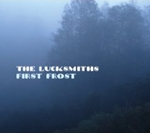The Lucksmiths, First Frost
review by dave heaton

First Frost opens with the first Lucksmiths song written by Louis Richter, who played guitar on the last album and has been playing with the band on tour for years now. Titled “The Town and the Hills”, it’s sung by drummer Tali White, the band’s lead vocalist no matter the songwriter (mostly Marty Donald, sometimes Mark Monnone, occasionally White). Richter wrote two of the album’s 14 songs. It’s a sign that The Lucksmiths are now officially a four-person band, though already the last album Warmer Corners benefited from his presence on guitar.
With each album their already pretty much perfect songwriting gets better, and over the last three albums, counting this new one, the music has jumped forward as well, with arrangements that are more sophisticated, in a good way. And at the same time the band keeps getting punchier. First Frost overall has a sense of wistfulness to it, but plenty of the songs have moments where the band pushes forward forcefully. The last time I saw them play live I was struck by how much faster they were playing, how much they rocked, even. On album they’ve translated that into compact bursts of energy without losing the subtler touch their thoughtful songs require. It’s a confidently written and played album, plentiful with winning melodies but also instrumental parts that do well to communicate the mood of the song and album. One such surprising but natural moment comes near the album’s end on the slow-and-steady “How We Met”, where the band builds up into a noisy shimmer, emulating the radio static mentioned in a lyric. The album is filled with other less dramatic, but no less enjoyable, musical moments.
”The Town and the Hills” sets up the mood of the LP well, by setting a very specific scene (“The clouds are hanging low / about the shoulders of the hills / where the shadow kills the light”) and then introducing characters, who bring along their own anxieties and dreams. First Frost is filled with daily-life stories, serious or light, smartly written into song. These observational stories carry little truths about human relationships and experiences, but are never heavy-handed about it, rarely even trying to pin down any truths as such.
”A Sobering Thought (Just When One Was Needed)” vividly describes a drunken night out on the town with an old friend. The spunky “South-East Coastal Rendezvous” (one of a couple songs here that I’ve taken to declaring as the pop hit of the season when it comes on) also has some people meeting up after a period apart, drinking a toast to the unknown (“here’s to who knows what”). The narrator of “How We Met” inadvertently eavesdrops on his lover at a party telling the story of how they met. The especially bittersweet “California in Popular Song” has someone moving to the western US, the song’s narrator explaining to her that moving doesn’t always make things right, and that songs aren’t always true: “All those songs about California lied / the stars won’t shine tonight / it isn’t going to be alright.”
The album’s characters seem to teeter-totter between worry and hopefulness, cynicism and optimism. Even a lost mitten comes to represent both, as a group-singalong breaks into the chorus “fingers crossed / all is not lost.” Entwined with that worry/hope balance are people and places – lovers separating, to uncertain end; cities quiet and still. The album’s final song, “Who Turned on the Lights?”, offers one last invigorating moment of uncertainty, in a song about both people and a city. It starts on a train, in the aftermath of a lovers’ spat. They reach a city that’s surprisingly bright, asking each other the title question in a tuneful chorus, strengthened by electric guitar and backing harmonies. It ends the album on an up note musically, and perhaps one for the album’s characters too: “I know we’re trembling now / but the lightning and rain are gonna pass…”
Copyright (c) 2008 erasing clouds |
|